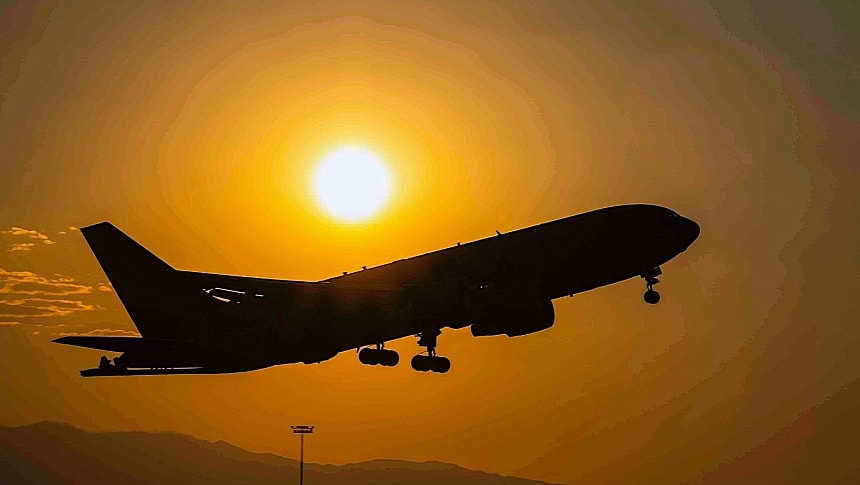Although there are several avenues of research being studied in a bid to reduce emissions levels in the aviation industry, sustainable aviation fuel (SAF) seems to be the most promising and the most widespread one. Already in use in some extent in civilian planes, the wonder fuel is now starting to be adopted by the military aviation as well.
SAF is a type of fuel made from non-petroleum feedstocks, a term which on a larger scale includes everything from waste to crops. This particular fuel however is made of recycled carbon resulting from waste oils, municipal solid waste, and plant residues.
In planes, it has the potential of cutting greenhouse gas emissions by as much as 94 percent, according to the U.S. Department of Energy, when used on its own. Sadly, today's airplanes burn a mixture of regular fuel with up to 50 percent SAF, the maximum allowed by regulations.
As said, most of the planes that currently use SAF serve civilian needs, but aerospace giant Boeing made an announcement over the weekend that might open the floodgates in the military world as well.
More to the point, the company issued something called a global No Technical Objection (NTO), meaning it leaves it up to each military plane operator to decide on whether to use SAF but, more importantly, it states that the fuel, used in the current allowed mixture, would not harm the planes in any way.
The NTO applies "to all Boeing-built defense aircraft and their derivatives." At the time of writing, the Boeing name was written on no less than 12 military airplanes, ranging from the F-15EX and F/A-18 Super Hornet fighter jets to the B-52 Stratofortress bomber and the Air Force One presidential transport.
The announcement comes on the wheels of the Royal Air Force (RAF) announcing that all its military aircraft, no matter who made them, can run on 50 percent SAF. It is expected more NATO members will do the same soon.
Boeing has been experimenting with SAF blends in military aircraft for more than a decade now. It started back in 2010 with a study performed on the C-17 Globemaster, and it even flew a Green Hornet at supersonic speeds on the stuff that same year.
The company has cleared its planes to run on SAF when mixed with Jet A or Jet A-1 fuel, but also with military-grade fuels the likes of JP-8/NATO F-34 or JP-5/NATO F-44.
It's unclear at this point how quickly Air Forces that use Boeing planes will switch to SAF blends, and also too early for us to get a sense of what the switch could mean for the environment. If one thing is certain is that now Boeing military aircraft can go about blwoing stuff while being environmentally conscious.
In planes, it has the potential of cutting greenhouse gas emissions by as much as 94 percent, according to the U.S. Department of Energy, when used on its own. Sadly, today's airplanes burn a mixture of regular fuel with up to 50 percent SAF, the maximum allowed by regulations.
As said, most of the planes that currently use SAF serve civilian needs, but aerospace giant Boeing made an announcement over the weekend that might open the floodgates in the military world as well.
More to the point, the company issued something called a global No Technical Objection (NTO), meaning it leaves it up to each military plane operator to decide on whether to use SAF but, more importantly, it states that the fuel, used in the current allowed mixture, would not harm the planes in any way.
The NTO applies "to all Boeing-built defense aircraft and their derivatives." At the time of writing, the Boeing name was written on no less than 12 military airplanes, ranging from the F-15EX and F/A-18 Super Hornet fighter jets to the B-52 Stratofortress bomber and the Air Force One presidential transport.
The announcement comes on the wheels of the Royal Air Force (RAF) announcing that all its military aircraft, no matter who made them, can run on 50 percent SAF. It is expected more NATO members will do the same soon.
Boeing has been experimenting with SAF blends in military aircraft for more than a decade now. It started back in 2010 with a study performed on the C-17 Globemaster, and it even flew a Green Hornet at supersonic speeds on the stuff that same year.
The company has cleared its planes to run on SAF when mixed with Jet A or Jet A-1 fuel, but also with military-grade fuels the likes of JP-8/NATO F-34 or JP-5/NATO F-44.
It's unclear at this point how quickly Air Forces that use Boeing planes will switch to SAF blends, and also too early for us to get a sense of what the switch could mean for the environment. If one thing is certain is that now Boeing military aircraft can go about blwoing stuff while being environmentally conscious.

































